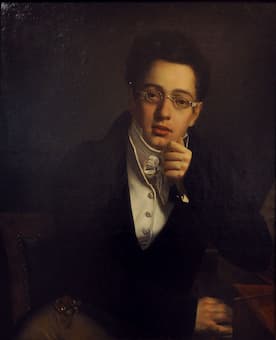
The young Schubert, 1814
Franz Schubert was born in the early afternoon of 31 January 1797 in a one-room apartment in a house called “The Red Crab”, then located in the district of the “Himmelpfortgrund,” an area northwest of the bustling and overcrowded center of the Imperial city of Vienna. Today it is part of the district of Alsergrund, and the still surviving building, turned into a small Schubert museum, now bears the address 54 Nussdorferstrasse. Schubert was born in the kitchen alcove next to the fireplace, which provided the only source of heat. His father Franz Theodor Florian Schubert had moved to Vienna from Moravia at the age of twenty, and followed in the footsteps of his older brother Karl who was the headmaster of the Carmelite School in the Viennese suburb of Leopoldstadt.
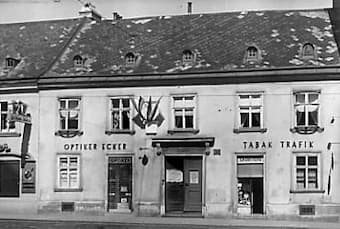
“The Red Crab”
Schubert’s father took up the position of schoolteacher in Vienna’s ninth district Lichtental, a trade “that offered little social standing or financial reward, as education was an enterprise supported only meagerly by the imperial government.” Within a year of arriving in Vienna, Franz Theodor met Maria Elisabeth Katharina Vietz, whose family had also migrated to Vienna from the Upper Silesian region. She worked as a maid for a Viennese family, and it has been suggested that her father, a locksmith and gun maker, had spent some time in prison for embezzlement. In the event, Franz and Elisabeth married in January 1785, and the union produced fourteen children, of which nine died in infancy.
Franz Peter Schubert: Fantasy in G Major, D. 1
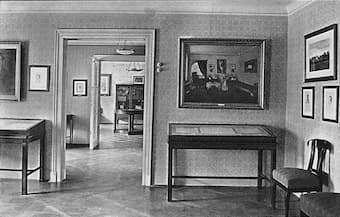
Interior of Schubert-Haus Museum, Nussdorfer Strasse 54, Vienna
Franz Peter was the twelfth child, and he was baptized the day after his birth with his uncle Karl Schubert named as godfather. The family moved into new nearby lodgings in 1802, where Schubert’s father established a private school. He steadily increased his student enrollment and by 1805 had 300 paying pupils. Franz Peter became a student in his father’s school, and apparently “was a high achiever.”
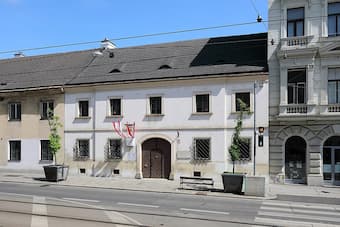
Schubert Museum, Alsergrund, Vienna
Musical training played no role in his formal education, but he received his first piano lessons from his older brother Ignaz. Ignaz remembered, “I was amazed when Franz told me, a few months after we began, that he had no need of any further instruction from me, and that for the future he would make his own way. And in truth his progress in a short period was so great that I was forced to acknowledge in him a master who had completely distanced and out stripped me, and whom I despaired of overtaking.” At the age of eight he became a choirboy at the parish church in Lichtental, where Michael Holzer, a student of Albrechtsberger, taught him. Holzer reported “whenever I wished to impart something new to him, he always knew it already.” At that particular time, if we can trust his brother Ferdinand, Schubert was already composing songs, string quartets and piano pieces.
Franz Schubert: “Hagars Klage,” D. 5
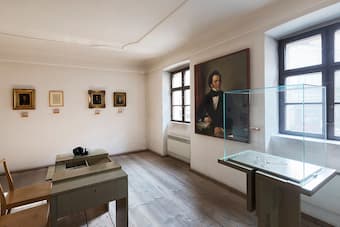
Schubert Geburtshaus, Exhibition view © Lisa Rastl/Wien Museum
Schubert auditioned for Antonio Salieri in 1808, and on his recommendation became a chorister in the Imperial and Royal City College. His acceptance into Vienna’s principle boarding school for non-aristocrats came with free tuition and board, and “his best possible opportunity for a quality education.” Music played an important role in the lives and education of the 130 boy-students, and Schubert was soon invited to join the student orchestra. Playing in the second violins section, Schubert became acquainted with the orchestral works of Haydn, Mozart and early Beethoven. According to a friend, “Mozart’s Symphony No. 40 in G minor and Beethoven’s Second Symphony made a particularly strong impression on Schubert.” Schubert also received permission to take formal theory lessons from Antonio Salieri, who quickly realized that he was looking at an exceptional talent. He gave him a number of Italian texts by Pietro Metastasio as homework assignments. Schubert never really had command of a foreign language, but he intuitively seemed to have grasped the musicality, syntax and dramatic possibilities of the Italian language.
Franz Schubert: String Quartet No. 4 in C Major, D. 46 (Festetics Quartet)
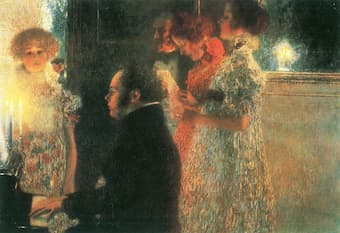
Klimt: Schubert at the Piano II
A fellow student, Josef Kenner, remembered the extraordinary times in the freezing cold piano room at the Imperial College. “It was there that his earliest compositions were first tried out and discussed and it was there that I was surprised by the dedication of the “Liedler,” which was handed over to me. You cannot possibly imagine how humble I felt at this mark of distinction, at this dedication, and at the truly friendly way in which it was done, because you know neither my admiration for Schubert’s artistic greatness nor my opinion of my own very humble merits. I did indeed know that Schubert craved merely for words which were fairly manageable and that therefore I had no reason to be in the least conceited because mine were chosen.” In the summer of 1812, after a mass performance, Schubert’s voice broke, memorialized by the composer’s entry on his part: “Schubert, Franz, crowed for the last time, 26 July 1812.” Schubert did remain at the Imperial and Royal City College for a fifth year, “but his increasing preoccupation with composition precipitated an inevitable decline in his academic performance, and he received warnings in both Latin and mathematics.” He was offered a scholarship for further study in 1813, “on the condition that he bring his academic subjects up to standard, since singing and music are but a subsidiary matter…” Schubert declined, and returned to his family home to take a teaching position in his father’s school. Before the age of 20, Schubert had composed five symphonies, four masses, six operas, three string quartets, three piano sonatas and about 300 songs.
For more of the best in classical music, sign up to our E-Newsletter
Franz Schubert: Symphony No. 1 in D major, D. 82
